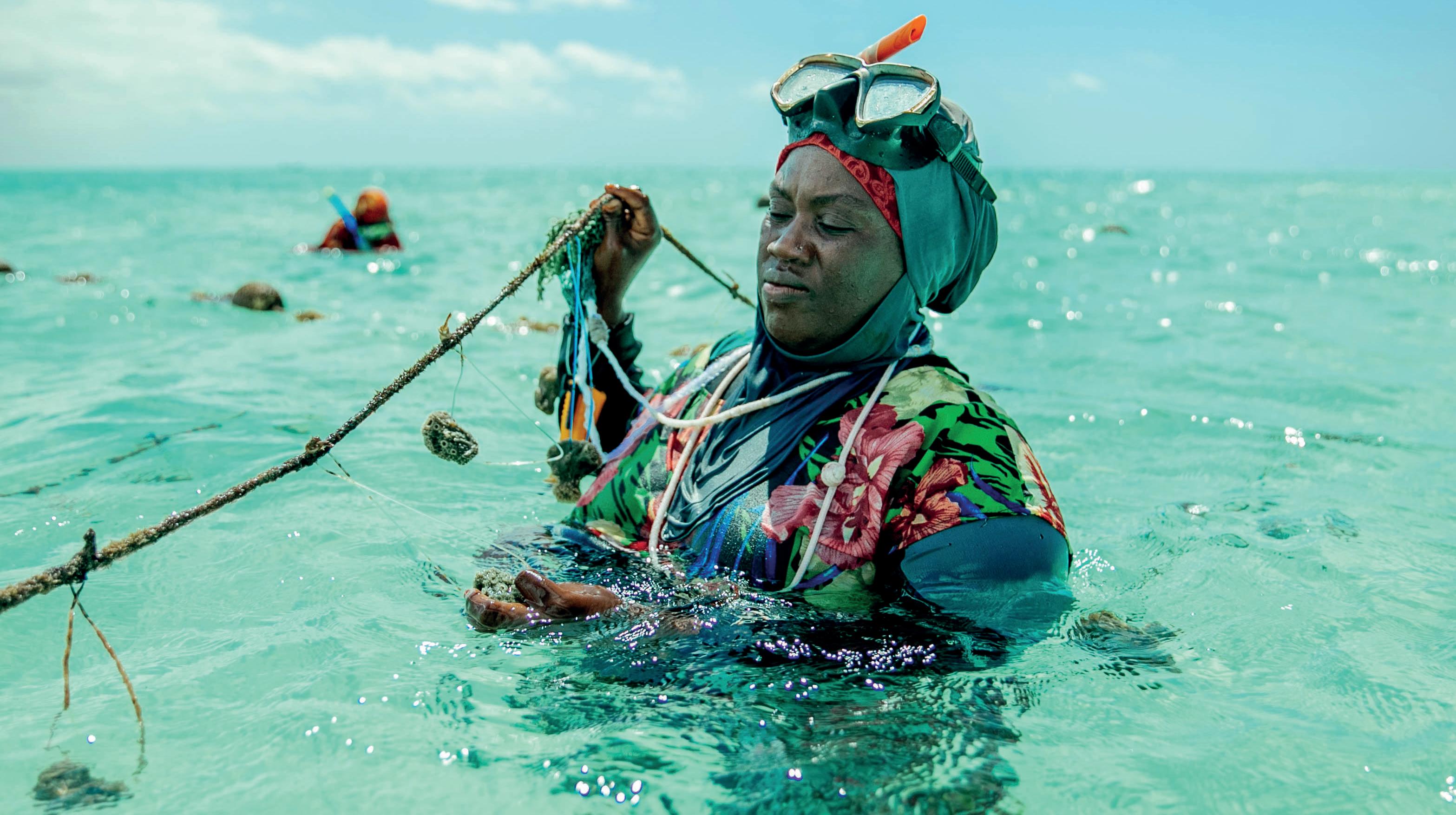Saved by sponge
Down To Earth
|December 16, 2023
As oceans warm up, women in Zanzibar switch from seaweed to climate-resilient sponge farming to stay afloat

AMID THE refreshing breeze caressing Zanzibar's Jambiani coast, Hindu Rajabu wades through knee-deep water to a lagoon. Wearing swimming goggles and a snorkel perched on her headscarf, the 31-year-old mother of two cautiously navigates the Indian Ocean to locate her floating sponge farm.
Rajabu is among a handful of women in Jambiani village who in 2020 started to cultivate natural sponges. These fascinating animals are made of loosely arranged cells that surround a skeleton of fibres. The specialised cells, nestled within thousands of tiny chambers, act as microscopic pumps, tirelessly drawing water into the sponge's body with their whip-like tails. This unique pumping mechanism, which helps sponges extract nutrition and oxygen, also purifies the ocean water by removing impurities, including sewage. These sponges are also used for bathing and general hygiene because they are naturally antibacterial and antifungal and can resist odours.
With the tide gently rising, Rajabu submerges herself to reach the buoys cradling the sponge farm. Carefully, she inspects the sponges, suspended from thick polyethylene ropes. Using a knife, she removes any fouling organisms, such as bacteria and fish, which have attached themselves to the ropes. This periodic cleaning is essential to prevent the sponges from being overwhelmed by these unwanted inhabitants. The sponge farms are made of multiple ropes that run parallel to each other. They have sponges at different development stages. "We usually harvest them once a week when we collect the sponges that are big enough to be sold in the market," says Rajabu. Women typically dive deep into the ocean to collect healthy wild sponges, which serve as the foundation for their farms that are set up close to the seashore where water is up to two metres deep. These sponge colonies are then carefully cultivated and fragmented to promote new growth.
Denne historien er fra December 16, 2023-utgaven av Down To Earth.
Abonner på Magzter GOLD for å få tilgang til tusenvis av kuraterte premiumhistorier og over 9000 magasiner og aviser.
Allerede abonnent? Logg på
FLERE HISTORIER FRA Down To Earth

Down To Earth
KING OF BIRDS
Revered for centuries, western tragopan now needs protection as its forests shrink, human pressures mount
3 mins
December 16, 2025

Down To Earth
WHISKERS ALL AQUIVER
Climate change threatens creatures that have weathered extreme environments for thousands of years
2 mins
December 16, 2025

Down To Earth
GOLDEN SPIRIT
Survival of the shy primate is closely tied to the health of Western Ghats
3 mins
December 16, 2025

Down To Earth
RINGED EYES IN THE CANOPY
Rapid habitat destruction forces arboreal langur to alter habits
2 mins
December 16, 2025

Down To Earth
HANGING BY THE CLIFF
The Himalaya's rarest wild goat is on the brink of local extinction
2 mins
December 16, 2025

Down To Earth
ANGEL OF THE BEAS
Conservation reserves, citizen science, and habitat protection give the Indus River dolphin a fighting chance in India
2 mins
December 16, 2025

Down To Earth
UNDER MOONLIT SCRUB
Survival of this hidden guardian tells us whether our scrublands still breathe
2 mins
December 16, 2025

Down To Earth
SYMBOL OF SILENT VALLEY
Lion-tailed macaque remains vulnerable despite past victories
2 mins
December 16, 2025

Down To Earth
THE APE IN OUR STORIES
India's only non-human ape species is a cultural icon threatened by forest fragmentation
2 mins
December 16, 2025

Down To Earth
SENTINEL OF THE HIGH COLD DESERT
The bird's evocative call may not continue to roll across the cold desert valley for long
3 mins
December 16, 2025
Translate
Change font size

